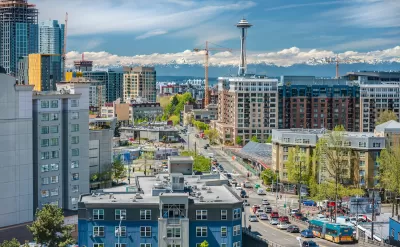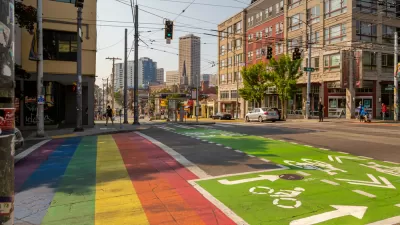Charging developers for improving local infrastructure impacted by their projects could boost transportation revenue, but permit applications in the city are slowing down.

he Seattle city council is once again weighing a proposal to institute transportation impact fees, which would impose a charge on new developments that would fund transportation improvements.
As Ryan Packer explains in The Urbanist, these fees are aimed at mitigating the impacts on local infrastructure and roads caused by new projects. “Transportation impact fees, a tool authorized by the state legislature as part of the Growth Management Act, are levied by more than 70 cities statewide but have never been used in Seattle.”
However, “the issue of adding additional fees on new housing during a well-identified affordability crisis is causing additional scrutiny of the idea.” The proposal is being appealed by a “shadowy group” called the Seattle Mobility Coalition, which claims that the city skimped on its environmental review of proposed development impact fees. As Packer notes, “an impact fee that discourages housing growth in Seattle, making sprawl more cost-competitive and drives up commute times would put more demand on the region’s transportation system overall, defeating the entire purpose of the impact fee program.”
Supporters of the fee see it as a replacement for revenue from the Move Seattle transportation levy, which expires next year. Meanwhile, development permit applications are slowing down, with a 62 percent decline in applications in the second quarter of 2023 from the previous year.
FULL STORY: Seattle Council Pushes Forward on Transportation Impact Fees

Maui's Vacation Rental Debate Turns Ugly
Verbal attacks, misinformation campaigns and fistfights plague a high-stakes debate to convert thousands of vacation rentals into long-term housing.

Planetizen Federal Action Tracker
A weekly monitor of how Trump’s orders and actions are impacting planners and planning in America.

In Urban Planning, AI Prompting Could be the New Design Thinking
Creativity has long been key to great urban design. What if we see AI as our new creative partner?

King County Supportive Housing Program Offers Hope for Unhoused Residents
The county is taking a ‘Housing First’ approach that prioritizes getting people into housing, then offering wraparound supportive services.

Researchers Use AI to Get Clearer Picture of US Housing
Analysts are using artificial intelligence to supercharge their research by allowing them to comb through data faster. Though these AI tools can be error prone, they save time and housing researchers are optimistic about the future.

Making Shared Micromobility More Inclusive
Cities and shared mobility system operators can do more to include people with disabilities in planning and operations, per a new report.
Urban Design for Planners 1: Software Tools
This six-course series explores essential urban design concepts using open source software and equips planners with the tools they need to participate fully in the urban design process.
Planning for Universal Design
Learn the tools for implementing Universal Design in planning regulations.
planning NEXT
Appalachian Highlands Housing Partners
Mpact (founded as Rail~Volution)
City of Camden Redevelopment Agency
City of Astoria
City of Portland
City of Laramie





























